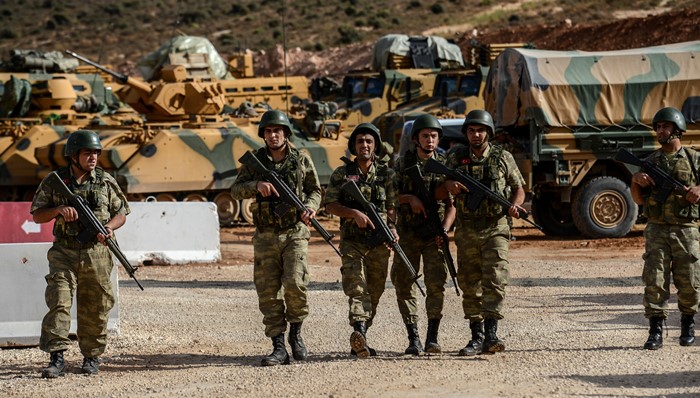Turkish-backed militants operating in Syria’s Idlib province plan to attack Turkish forces and blame it on the Syrian army, Russia’s state-run news agency TASS reported on Tuesday.
“According to our information, militants from terrorist organizations plan to carry out a shelling attack near the Tedil settlement in the Idlib province, using mortars and multiple-launch rocket systems,” TASS quoted Alexander Grinkevich, deputy chairman of the Russian Center for Reconciliation of the Opposing Sides in Syria, as saying.
Turkey has 12 observation posts in Idlib province, nine of which had already been surrounded by the forces of Syrian President Bashar al-Assad during clashes in March, prior to the conclusion of a ceasefire with Russia. Turkey then lost 60 Turkish soldiers around its military posts, while Turkish-backed rebels had lost control of a large chunk of territory in the region.
Turkey had allegedly failed to supply its nine posts for 30 days during the March fights as they were isolated behind Syrian regime lines. Since then, the Syrian regime has further pressured the Turkish posts by settling civilians around them, according to a report by Middle East Eye.
Since the March ceasefire, Russian forces had until recently escorted Turkish supply missions in order to protect them from Syrian fire. The situation in the region started changing in September when talks between Turkish and Russian officials failed.
As in the case of Nagorno-Karabakh, Turkey and Russia back opposing sides in Syria’s war, with Ankara supporting the rebels and Moscow backing Damascus. Under the brokered partial ceasefire, the fighting has significantly decreased, with intermittent airstrikes and artillery attacks from both sides.
“Terrorists intend to post a video showing the consequences of the shelling on the Internet and blame Syrian government forces of attacking Turkish positions,” Grinkevich noted.
The Russian Center for Reconciliation called on the commanders of rebel units to abandon arms and join peaceful efforts to resolve the situation in the areas they control, TASS reported.
Troops amassed, region braces for showdown
Observers noted recent movement in the forces of the two major actors in Syria, as Turkey and the Russian-backed Damascus regime are reportedly amassing forces near the last rebel-held enclave of northwestern Idlib province in what appears to be preparations for a major showdown involving a NATO army against Russian equipment in the country’s protracted civil war.
A new Turkish column of nearly 20 vehicles carrying military and logistical supplies crossed into Syrian territory on Tuesday, the Syrian Observatory for Human Rights (SOHR) war monitor reported.
Since February 2, more than 10,730 trucks and military vehicles have entered Idlib province, including tanks, personnel carriers, armored vehicles, mobile bulletproof guard booths and military radars, in addition to the entry of hundreds of soldiers, SOHR reported.
Turkish forces are continuing their withdrawal from the Sher Maghar post in Jabal Shahshbo, in northwestern Hama province, to a military post in the village of Qoqfin in the southern Idlib countryside.
SOHR also said it had monitored the complete evacuation of the Turkish observation post in Idlib’s Murek district, 10 days after Turkish forces began dismantling it.
Turkish forces set up this post, Ankara’s biggest in the region, 30 months ago on April 7, 2018.
“I think these withdrawals are clearly related to the Turkish expectation of a new military operation by the Assad regime supported by Russia and Iran,” a security source speaking to TRT World said on October 20.
“In the event of a military escalation in Idlib, the weakest point for Turkey are these observation posts because they are way behind the front lines. The geographic distance is a threat for Turkey,” added the source, who wanted to remain anonymous.

